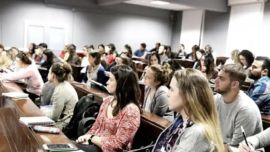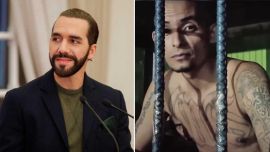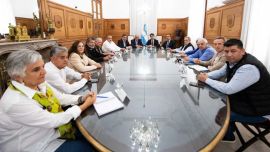The never-ending AMIA bombing probe came back in full force this week,as the fallout from last week’s rulings by Federal Judge Claudio Bonadio continued to reverberate across national politics. Bonadio shook the political world last week with a bombshell ruling that asked for the jailing of former president and senator, Cristina Fernández de Kirchner, former foreign minister Héctor Timerman, and a host of secondary characters for high treason in relation to the controversial Memorandum of Understanding (MoU) with Iran, in the context of the AMIA terrorist attack. In a headline move, Bondio requested that Fernández de Kirchner be stripped of her congressional immunity and arrested immediately. According to judicial sources, in his ruling Bonadio reasoned that the former president may use her contacts to “obstruct the case.”
Basing his ruling on late AMIA special prosecutor Alberto Nisman’s complaint, filed four days before he was found dead with a gunshot wound to the head in January 2015, Bonadio accused Fernández de Kirchnerand her acolytes of colluding with Iran to cover up their involvement in the dual AMIA (1994) and Israeli Embassy (1992) bombings in exchange for a deal involving grains and hard currency. Prior to his death4, Nisman alleged that the government had offered impunity for Iranian officials (Moshen Rezai, Ali Fallahian, Ahmad Vahidi, Moshen Rabbani and Ahmad Asghari) in exchange for trade deals.
One of the most damaging and contentious points was the Fernández de Kirchner administration’s alleged intention to push for dropping Interpol red notices, or international arrest warrants, for high-level Iranian nationals.
Both Fernández de Kirchner and Timerman were quick to respond this week, publicly telling Bonadio that dropping the red notices didn’t depend on the Foreign Ministry or the Executive Branch, rather it was a judicial decision taken by the judge in charge of the case.
Former Interpol secretary general Ronald Noble reiterated the same via Twitter on Tuesday describing the accusations as “false” and “incomplete.” Using the social network, Noble asked Bonadio why he hadn’t been contacted, and whether he understood that Interpol had no intention of dropping the red notices despite the signing of the MoU.
According to Perfil’s Gabriel Ziblat, the first prosecutor in the case, Gerardo Pollicita, tried to get Noble to testify, but Pollicita first crashed up against Interpol’s immunity, only to be notified that Noble was residing in Dubai, after which he desisted. Sources suggest Noble works for a London law firm that advises Iran, Ziblat reported.
In another notable development, on Wednesday La Nación published a letter sent by Iranian Foreign Minister Javad Zarif in which he indicated that indeed the negotiations leading to the signing of the MoU would lead to the revocation of the red notices.
“After [signing the MoU] and following the political will of both governments the legislative and competent institutions of both nations corroborated it,” read the letter received by Argentine Foreign Minister Jorge Faurie. “Following this line and immediately after the signing […the Foreign Ministries of both nations] sent a joint letter to the Secretary General of Interpol referring to the aforementioned agreement and our intention to collaborate bilaterally, soliciting that Interpol put an end to its obligations with regards to the AMIA case,” the letter read.
Timerman, who has been placed under house arrest and is currently battling an aggressive form of cancer, has asked for a swift trial so he can defend himself. “I have the right to have a trial before I pass away,” he said in an interview on AM 750 radio, “they can’t make me wait 14, 10, 8 or even one year, if I’m already being accused and evidence has been found, let’s go to trial.”
Speaking to Pagina 12, Timerman said he and former government officials were being punished by the global political establishment for their audacity in trying to resolve the AMIA bombing case after 20 years of dead-ends.
He said the DAIA Jewish community organisation was acting on behalf of the Mauricio Macri administration and the Israeli Embassy. Fernández de Kirchner has appealed the rulings against her.




















Comments